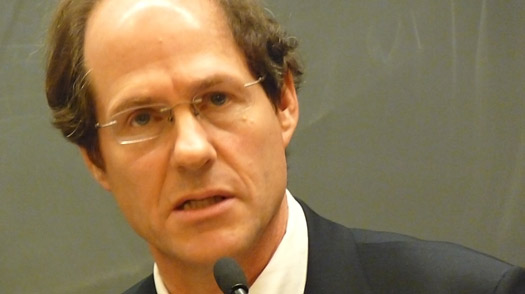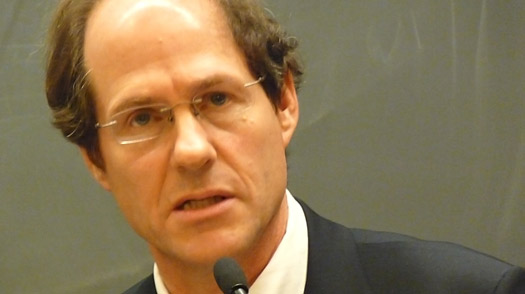 Cass SunsteinAfter weeks of sustained attack from the right-wing on issues that are marginal to the job the President asked him to do, Cass Sunstein has emerged from the nomination process bloody but apparently unbowed (here’s yesterday’s roll call). He is now the nation’s “regulatory czar,” Director of the White House Office of Management and Budget, Office of Information and Regulatory Affairs.
Cass SunsteinAfter weeks of sustained attack from the right-wing on issues that are marginal to the job the President asked him to do, Cass Sunstein has emerged from the nomination process bloody but apparently unbowed (here’s yesterday’s roll call). He is now the nation’s “regulatory czar,” Director of the White House Office of Management and Budget, Office of Information and Regulatory Affairs.
Although Professor Sunstein has been sitting in the Old Executive Office Building for months, he has undoubtedly been preoccupied with his nomination battle. Having survived the occasionally nonsensical trial by partisan and self-serving flight of fancy that was his confirmations process, we hope he will notice that his staff at OIRA has been behaving as if the 2008 election never happened. Having paid careful attention to OIRA over these past few months, in search of evidence of a new outlook, I’m sorry to report that I’ve drawn the strong impression that Bush Administration culture and ideology remain unchanged at OIRA. To deliver change we can believe in, Cass Sunstein needs to convert OIRA from industry waiting room to objective arbiter of inter-agency disputes.
My impression that change has not yet arrived is based in great measure on a chart [PDF] compiled and released today by the Center for Progressive Reform, showing that in recent months, OMB met nine times with outsiders to discuss health and safety regulations, and that eight of those meetings were dominated by industry representatives complaining about proposals under development at the Environmental Protection Agency (EPA), the Food and Drug Administration (FDA), and the National Highway Traffics Safety Administration (NHTSA). For example, tire manufacturers met to discuss NHTSA’s proposals on inflating tires to increase fuel efficiency. The oil industry met to discuss EPA’s rule on the reporting of greenhouse gas emissions. And the airline industry met to discuss EPA’s rule on water discharges from airport de-icing operations. Public interest groups have met with OIRA on only one regulatory matter: amendments to an EPA rule on renewable fuels. That meeting was one in a set of four, with the other three devoted to the views of the American Petroleum Institute, the biodiesel industry, and Shell Oil.
Now, OIRA may well take the view that when you hold an open house for the neighborhood, you cannot help who drops by. But the history of the office makes that seem like a superficial argument. For years, and especially during the tenure of Presidents Reagan, Bush I, and Bush II, OIRA has served as a backdoor for regulated industries, giving those aggrieved by agency decisions a second, third, and fourth bite at the apple to press their case. Having failed to persuade Congress of their arguments during the legislative process and then the regulatory agency during their deliberations, industry has found a friendly hearing from OMB, and OMB has too often watered down or scuttled regulations afterwards. But even if OMB staff sit silently at the meetings, giving an audience to industry complainants but not otherwise agreeing to overturn agency decisions, the practice is questionable. As experience in the courts since before the nation was founded has convinced us, only by airing all sides of a dispute through balanced advocacy can a wise decision be made.
Even if for some elusive reason we were willing to accept OMB’s “listening post” justification for these meetings, the sad fact is that objective evaluation of OMB’s role is impossible because OMB discloses only the fact of meeting, not its outcome. While this quasi-transparency is better than nothing, it cannot allay suspicions that the regulatory czar’s job is to kill, not improve, regulation.
We look forward to working with Cass Sunstein. And we also promise to stay in his face, making sure he remembers that his biggest challenge is to revive strong government protection of environmental quality, food, drug, and worker safety, and the control of climate change, not working to appease industry. We wish him luck and success.
This post originally appeared in the Center for Progressive Reform blog.




